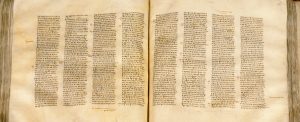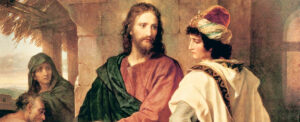Sunday before Christmas
Hebrews 11:9-40; Matthew 1:1-23
Glory to God the Father, the Son, and the Holy Spirit. Amen.
This morning, on the Sunday before the Nativity of Christ, we commemorate the holy Ancestors of Christ. So we have just read the genealogy of Christ.
In my experience, there is a difference between cat people and dog people. I hear dog people say things like, “This is my handsome boy General Kenobi Hakuna Matata Pontefract! He’s a pedigree Aussiedoodle and I paid $3000 for him last September and I finally got to take him home today,” and they can show you his Kennel Club family tree. Cat people are more like: “This is Fred. He’s a trash gremlin.”
How many of us, every time we read the Gospel according to Saint Matthew, skim over the begats? Abraham, Isaac, Jacob …um… Joseph the husband of Mary, there we go! Most of us in our culture are hard-pressed to name our great-grandparents.
But there are cultures where, if you can’t introduce yourself and name a good seven generations of your ancestors, you’re saying you are nobody. In these cultures, when an apostolic missionary begins his account of the work of Christ with a genealogy, he catches everyone’s attention: Sit up straight and pay respect; this is someone important.
The ancient Hebrews were a patriarchal culture, so it’s a list of fathers. With five exceptions. It’s a list of revered elders and famous ancestors to brag about. With five exceptions.
It’s not just interesting that there are five women in this genealogy; look them up and it’ll become apparent that they are five scandalous women.
Tamar, who had to resort to deception and pose as a prostitute to obtain the legitimate son the Law entitled her to.
Rahab, the prostitute at Jericho who saved the Hebrew spies.
Ruth, the unclean Moabite foreigner, who became the wife of Boaz and grandmother of King David.
Bathsheba, whom David procured for his sins of adultery and murder, and later married – the mother of King Solomon.
And finally Mary, the teenaged temple virgin, betrothed to the elder Joseph, who was discovered to be pregnant. Joseph was minded to put her away until an angel convinced him that Mary’s child was a miracle from God. Our tradition suggests Joseph continued to have doubts. In the Akathist of the Nativity, we sing: “The chaste-minded Joseph, who before had within him a storm of doubting thoughts, now beholds all-glorious things within the divine cave” (Kontakion 4). In many Nativity icons, even as the Virgin and Child are at the center, off in the margins you’ll see Joseph being tempted by a stranger who is whispering slander in his ears.
Joseph wasn’t the only one with suspicions: The Jewish books called the Talmud describe Jesus as ben stada, the son of the adulteress. There he’s labeled the son of some random Roman soldier.
The Virgin Mother of God is not ashamed to be numbered with these other scandalous women, who found favor with God and who are numbered among the honored Foremothers of Christ.
Saint John Chrysostom says that Christ was not embarrassed by the skeletons hidden in His ancestors’ closets. The conclusion of the genealogy is the beginning of a new generation. The age of preparation and promise is over; the fullness of time has come. And soon we will celebrate the culmination of this festal season: The Great Feast of Holy Theophany: The baptism of our Lord in the River Jordan. If it weren’t for one silly Christmas carol, our culture would have completely forgotten there are Twelve Days of Christmas: a period of feasting and worship that begins with our Lord’s virgin birth and culminates in his manifestation to the world, “This is my beloved Son in whom I am well-pleased.”
This Feast is the full revelation of God as Trinity: the divine Son of God who receives royal gifts and the worship of angels and shepherds, the Lamb of God who takes away the sins of the world, on whom the Holy Spirit descends, and who receives the testimony of God the Father.
Scripture does not furnish us with a sentimental family holiday. Instead, in the Wisdom of Solomon, we read:
For while gentle silence enveloped all things, and night in its swift course was now half gone, thine Almighty Word leaped down from heaven, out of thy royal throne, as a fierce man of war into the midst of a land of destruction, and brought thine unfeigned commandment as a sharp sword (Wisdom 18:14-16).
Christmas in America, after about a hundred years of relentless marketing, has become “The Most! Wonderful! Time! of the year!” a period of compulsive consumption and profit that overshadows every other civil observance. Lost in the secular and even religious hustle is the fact Saint Matthew reveals as he begins his Gospel.
The Hebrew Bible opens with, “In the beginning, God created.” So in Hebrew that book is named from its first word, Bereshit, In the Beginning. Our Greek Old Testament translates that name, so in our Bibles it’s named Genesis.
Saint Matthew’s opening words are: Βίβλος γενέσεως Ἰησοῦ χριστοῦ, The book of the genesis, the beginning, the origin, of Jesus Christ. He is consciously writing the new Genesis to chronicle the origin of the age to come, the new covenant. This is not the story of sweet little Baby Jesus laid in a manger – it’s the prologue to the announcement that a new King has begun to reign and is coming to judge the earth. The Kingdom of God is at hand (Matthew 3:2; 4:17; Mark 1:15).
Therefore, from now on, we regard no one according to the flesh. Even though we have known Christ according to the flesh, yet now we know him thus no longer. Therefore, if anyone is in Christ, he is a new creation; old things have passed away; behold, all things are made new. Now all things are of God, who has reconciled us to himself through Jesus Christ, and has given us the ministry of reconciliation (2 Corinthians 5:16-18).
[For] you are a chosen generation, a royal priesthood, a holy nation, a people belonging to God, that you may proclaim the praises of him who called you out of darkness into his marvelous light (1 Peter 2:9).
The Targums are ancient Aramaic paraphrases of the Hebrew Bible, which give us something of a “Jewish theological screen shot” of the time in which they were written. The Targum Jonathan of Isaiah 9:6 reads:
The prophet said to the house of David, For unto us a child is born, unto us a son is given, and he has taken the law upon himself to keep it. His name is called from eternity wonderful, the mighty God who lives to eternity, the Messiah whose peace shall be great upon us in his days.
“He will save his people from their sins,” the Gospel says. (Matthew 1:21) Chrysostom reminds us, “He becomes flesh; his divine nature unchanged… and all sinners come to see the Lamb of God who takes upon himself the sin of the world… O unutterable grace! for the Ancient of Days has become a child” (Homily on the Nativity of Christ).
The Lord said, “The Kingdom of God is in your midst” (Luke 17:21). And at Christmas we’re reminded that Emmanuel means “God With Us.” I’m always comforted to read, “Lo, I am with you always, even unto the end of the age” (Matthew 28:20) and “I will never leave you nor forsake you” (Hebrews 13:6; Deuteronomy 31:8). But that should also be a sobering reality. At Great Compline, we sing Isaiah chapter 8, with the repeated refrain “For God is with us.” That’s meant to bring to mind the armies of the Hebrews, advancing to defend themselves, carrying the Ark of God’s presence:
God is with us. Understand, all ye nations, and submit yourselves: For God is with us.
Hear ye, even unto the uttermost ends of the earth: For God is with us.
Submit yourselves, ye mighty ones: For God is with us.
If again ye shall rise up in your might, again shall ye be overthrown: For God is with us.
And the refrain is repeated again and again to exhort the faithful to courage and perseverance, and to literally put the fear of God in our enemies. “For we wrestle not against flesh and blood, but against principalities, against powers, against the rulers of the darkness of this world, against spiritual wickedness in high places” (Ephesians 6:12). For God is with us!
In a few more days we’ll sing together,
Christ is born, glorify him!
Christ comes from heaven, go to meet him!
Christ is on earth, be exalted!
Sing to the Lord, all the earth,
and praise him in gladness, O people,
for he has been glorified!
(Canon of Nativity)
The hymns exhort us to accompany the kings and shepherds and “go to meet him.”
Today, the Sunday before Nativity, we are repeating the sermon of John the Forerunner, exhorting us to “prepare the way of the Lord.” Saint John is quoting the prophecy of Isaiah:
The voice of one crying in the wilderness: “Prepare the way of the Lord! Make straight in the desert a highway for our God. Every low place shall be raised up and every mountain and hill brought low; the crooked places shall be made straight and the rough places smooth; the glory of the Lord shall be revealed, and all flesh shall see it together; for the mouth of the Lord has spoken” (40:3-5).
This is the work of preparation. To come to the feast of the Nativity with a heart ready for the grace of God takes just a little attention.
Have you been struggling to keep the fast? Keep struggling! The finish line is near! Have you disregarded the fast? You have time!
Our Lord knows the difference between the person who lives without repentance or struggle, and the person who struggles but is just really bad at being a disciple. If our feet are set on the path of repentance and faithfulness, then even stumbling constantly, we are pursuing Christ and he remains faithful to us in return.
Your intention and action, even if it doesn’t impress you, is a preparation of your heart for the coming of grace.
Prepare ye the way of the Lord, and let’s make haste together to the Nativity of Christ.
Bethlehem has opened Eden. Come, let us see!
We have found joy in a secret place.
Come, let us seize Paradise hidden in the cave!
There the has appeared the Root no man has watered,
blossoming with forgiveness.
There is found the Well which no man dug,
from which David longed to drink of old.
There the Virgin has borne a child,
quenching Adam’s thirst and David’s.
Let us hurry to this place,
where the eternal God has been born as a little Child!
(Ikos from Nativity Matins)
To the glory of God the Father, the Son, and the Holy Spirit.






